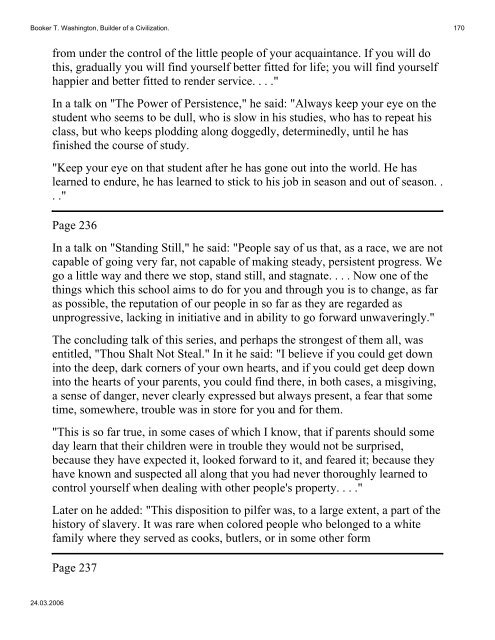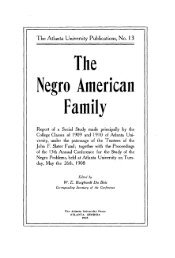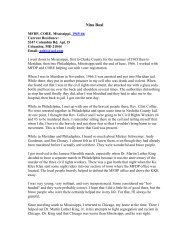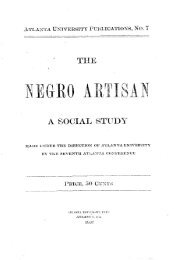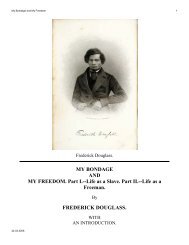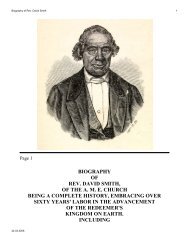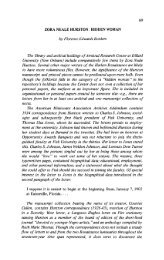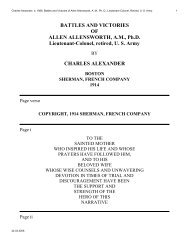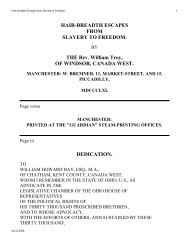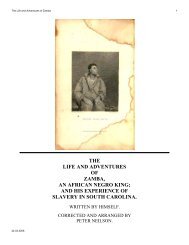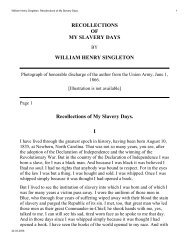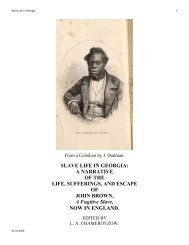Booker T. Washington, Builder o - African American History
Booker T. Washington, Builder o - African American History
Booker T. Washington, Builder o - African American History
You also want an ePaper? Increase the reach of your titles
YUMPU automatically turns print PDFs into web optimized ePapers that Google loves.
<strong>Booker</strong> T. <strong>Washington</strong>, <strong>Builder</strong> of a Civilization. 170<br />
from under the control of the little people of your acquaintance. If you will do<br />
this, gradually you will find yourself better fitted for life; you will find yourself<br />
happier and better fitted to render service. . . ."<br />
In a talk on "The Power of Persistence," he said: "Always keep your eye on the<br />
student who seems to be dull, who is slow in his studies, who has to repeat his<br />
class, but who keeps plodding along doggedly, determinedly, until he has<br />
finished the course of study.<br />
"Keep your eye on that student after he has gone out into the world. He has<br />
learned to endure, he has learned to stick to his job in season and out of season. .<br />
. ."<br />
Page 236<br />
In a talk on "Standing Still," he said: "People say of us that, as a race, we are not<br />
capable of going very far, not capable of making steady, persistent progress. We<br />
go a little way and there we stop, stand still, and stagnate. . . . Now one of the<br />
things which this school aims to do for you and through you is to change, as far<br />
as possible, the reputation of our people in so far as they are regarded as<br />
unprogressive, lacking in initiative and in ability to go forward unwaveringly."<br />
The concluding talk of this series, and perhaps the strongest of them all, was<br />
entitled, "Thou Shalt Not Steal." In it he said: "I believe if you could get down<br />
into the deep, dark corners of your own hearts, and if you could get deep down<br />
into the hearts of your parents, you could find there, in both cases, a misgiving,<br />
a sense of danger, never clearly expressed but always present, a fear that some<br />
time, somewhere, trouble was in store for you and for them.<br />
"This is so far true, in some cases of which I know, that if parents should some<br />
day learn that their children were in trouble they would not be surprised,<br />
because they have expected it, looked forward to it, and feared it; because they<br />
have known and suspected all along that you had never thoroughly learned to<br />
control yourself when dealing with other people's property. . . ."<br />
Later on he added: "This disposition to pilfer was, to a large extent, a part of the<br />
history of slavery. It was rare when colored people who belonged to a white<br />
family where they served as cooks, butlers, or in some other form<br />
Page 237<br />
24.03.2006


